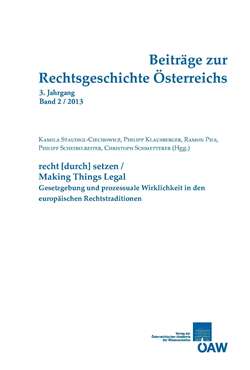
Beiträge zur Rechtsgeschichte Österreichs 2 / 2013, pp. 465-472, 2014/01/30
recht [durch] setzen - Making Things Legal.
Gesetzgebung und prozessuale Wirklichkeit in den europäischen Rechtstraditionen

After World War II in Central and Eastern Europe cinema and literature were harnessed in the construction of a new order (as earlier in the USSR). Contrary to traditional belief, it was built not only on violence. Ideology played a fundamental role in the escape from postwar nihilism and convinced many intellectuals to join building the “better world”. The propaganda was supposed to effectively influence the minds of those who did not understand the laws of historical necessity. Law-making and the making of cultural texts were tied together in an unprecedented way. Which results did it bring to cinematography? How did the law and cultural texts present the new order? Which conclusions remain relevant from that lesson of “making things legal”?